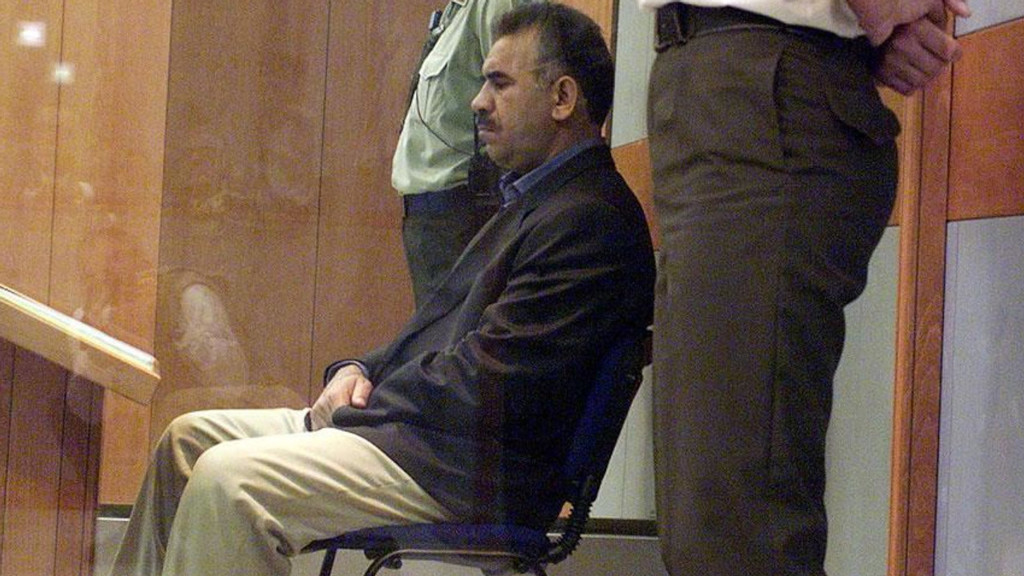Jailed PKK leader Abdullah Öcalan received his first visitors in 43 months on Wednesday, his nephew said, the same day a deadly blast rocked Ankara that Turkey said was likely carried out by Öcalan’s outlawed Kurdistan Workers’ Party (PKK), Agence France-Presse (AFP) reported on Thursday.
Öcalan, the leader of the PKK — designated as a terrorist group by Turkey and its Western allies — has been held on a prison island since 1999.
“Our last face-to-face meeting with Abdullah Öcalan took place on March 3, 2020,” Ömer Öcalan said on X on Thursday, adding that the family met with him again “years later on October 23, 2024.”
He said family visits are a legal right and expressed his desire for them to continue.
Sayın Abdullah Öcalan ile en son yüz yüze yapılan görüşme 3 Mart 2020 tarihiydi.
Biz aile olarak yıllar sonra 23 Ekim 2024 günü Sayın Öcalan ile görüşme gerçekleştirdik.
Bir yasal hak olan rutin aile görüşünün, koşullar ne olursa olsun devam etmesini istiyoruz.— Ömer ÖCALAN (@omerrocalan) October 24, 2024
The PKK leader reportedly commented on Turkey’s broader political situation during the meeting, conveying a message through his nephew. “My isolation is continuing. If conditions allow, I have the theoretical and practical power to move this process from a stage of conflict and violence to a legal and political ground,” Öcalan said.
23 Ekim tarihinde İmralı Ada Hapishanesi’de Sayın Öcalan ile görüşme gerçekleştirdim.
Bu ziyaret aile görüşmesi kapsamında gerçekleşti. Sayın Öcalan görüşmede genel siyasi gelişmelere ilişkin değerlendirmelerde bulunarak kamuoyuna şu mesajın iletilmesini istedi: “Tecrit devam…
— Ömer ÖCALAN (@omerrocalan) October 24, 2024
The visit comes at a time when Ankara appears to be reconsidering the resumption of dialogue with the PKK, after an almost 10-year freeze in peace efforts. The reason for the effort is to prevent Iran from reaching out to Kurdish fighters to destabilize Turkey during a possible escalation with Israel, according to a report by Al-Monitor earlier this month.
The PKK leader’s message refers to a recent call by far-right Nationalist Movement Party (MHP) leader Devlet Bahçeli, a key ally of President Recep Tayyip Erdoğan, that sparked outrage and skepticism among several opposition parties while receiving support from pro-Kurdish politicians.
The MHP leader said during a group meeting of his party earlier this week, that if Öcalan’s “isolation” were lifted, he could appear at the group meeting of the DEM Party and declare the dissolution of the PKK, signaling an end to decades of violence.
The “isolation” of Öcalan, who has been jailed in a high-security prison on İmralı Island in the Sea of Marmara since 1999, refers to his inability to speak with his lawyers for years.
Just a day after Bahçeli’s call and on the same day of Öcalan’s meeting with his nephew, five people were killed and 22 others wounded in an attack on a top Turkish defense contractor near Ankara that the government said was “very likely” carried out by Kurdish militants.
Turkey launched strikes on Kurdish militants in Iraq and Syria after the attack on the headquarters of the state-run Turkish Aerospace Industries (TAI) some 40 kilometers (25 miles) north of Ankara.
The attack came as Turkey’s political establishment appeared to be leaning towards a political, negotiated solution to the decades-long conflict with the Kurdish militants.
The MHP’s longstanding position is to oppose any Kurdish autonomy and demonize the pro-Kurdish DEM Party, viewing it as a political front for the PKK. The change in attitude has prompted questions about Bahçeli’s motivation and whether this is driven by political calculations as Erdoğan eyes a third term in 2028 or attempts to secure Kurdish votes for his plans to amend the constitution.
This evolving situation has echoes of Turkey’s previous attempt at a peace process that collapsed in 2015. At that time, Erdoğan engaged in negotiations with Öcalan and his Syrian Kurdish allies, announcing a 10-point agreement that envisioned reforms loosening restrictions on Kurdish identity in return for the PKK laying down its arms. However, the peace process unraveled due to a combination of geopolitical factors, including US support for Syrian Kurdish groups in the fight against the Islamic State in Iraq and the Levant (ISIL) as well as internal resistance from the Turkish military and the MHP.
The PKK has waged an insurgency against the Turkish state since 1984, claiming tens of thousands of lives.


